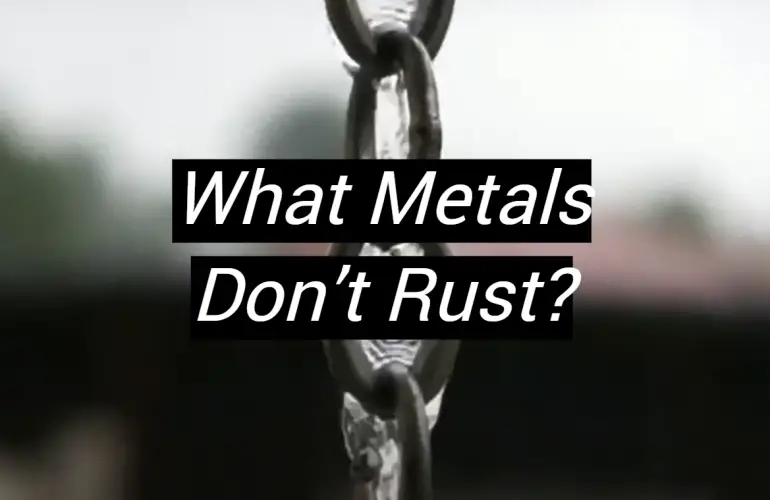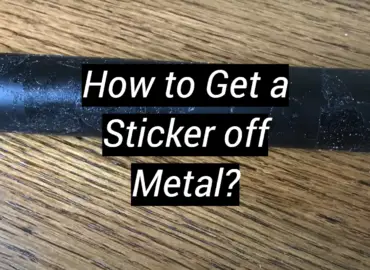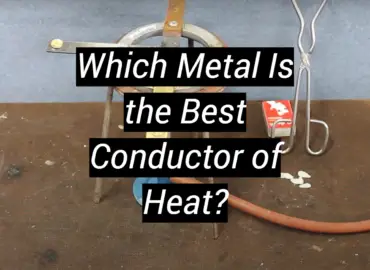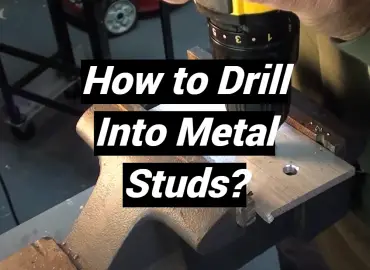Do you know what metals don’t rust? Many people don’t realize that there are a number of different metals that don’t corrode or rust. In this article, we will discuss the different types of metals that don’t rust and why they are resistant to corrosion. We will also provide some helpful tips on how to protect your metal belongings from rust and corrosion. Read on to learn more!
What Causes Metal to Rust?
Before we discuss which metals don’t rust, it’s important to understand what causes metal to corrode in the first place. Rust is simply the oxidation of iron. When iron is exposed to oxygen and water, it will begin to corrode. The resulting product is a reddish-brown substance known as iron oxide, or rust.
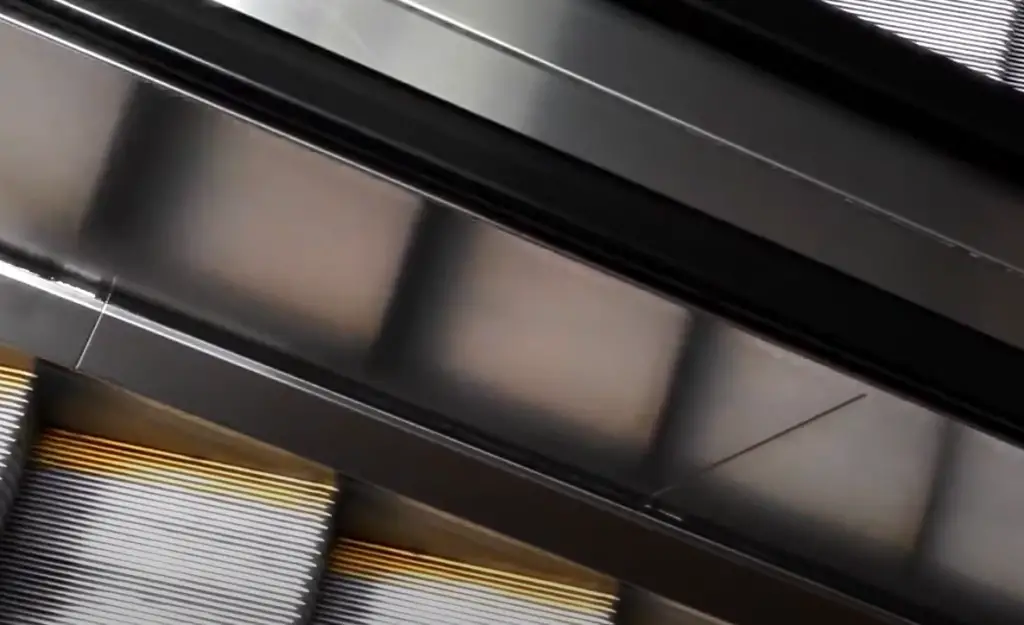
There are a number of factors that can speed up the corrosion process, including:
- Acid rain
- Salty air (i.e. near the ocean)
- High humidity
- Pollution
- Poor ventilation[1]
What is Corrosion?
Corrosion is the process by which metal is slowly degraded and destroyed by reaction with its environment. This can be due to a number of factors, including exposure to water or chemicals, or simply the presence of oxygen in the air. Over time, corrosion can cause metal to weaken, break down, and eventually fail.[1]
The Difference Between Rust and Corrosion
Most people think of rust as a general term for the deterioration of metals. However, technically speaking, rust is a specific type of corrosion that affects iron and steel.
There are many different types of corrosion, but not all of them result in rust. In fact, there are some metals that are highly resistant to rusting. Here are a few examples:
- stainless steel
- aluminum
- copper
- bronze
- brass
- galvanized steel
Metals That Don’t Rust
Aluminum
Aluminum is a silvery-white metal that is light in weight yet strong. It is widely used in transportation, building and construction, packaging, electronics, and many other industries. aluminum does not rust, making it an ideal material for applications where corrosion resistance is required.
Brass
Brass is an alloy of copper and zinc. It has a yellowish color and is often used for decorative purposes. Brass does not rust, making it an ideal material for applications where corrosion resistance is required.
Bronze
Bronze is an alloy of copper and tin. It has a reddish color and is often used for decorative purposes. Bronze does not rust, making it an ideal material for applications where corrosion resistance is required.
Copper
Copper is a reddish-brown metal that is soft and malleable. It is widely used in electrical wiring, plumbing, roofing, and many other applications. Copper does not rust, making it an ideal material for applications where corrosion resistance is required.
Corten or Weathering Steel
Corten is a type of steel that is designed to withstand the elements. It is often used in construction, landscaping, and other outdoor applications. Corten does not rust, making it an ideal material for applications where corrosion resistance is required.
Galvanized Steel
Galvanized steel is steel that has been coated with a layer of zinc. This protects the steel from corrosion and extends its lifespan. Galvanized steel does not rust, making it an ideal material for applications where corrosion resistance is required.
Gold
Gold is a soft, yellow metal that is prized for its beauty and its usefulness in jewelry and other applications. Gold does not rust, making it an ideal material for applications where corrosion resistance is required.
Platinum
Platinum is a white metal that is rare and expensive. It is often used in jewelry and other applications where its beauty is admired.
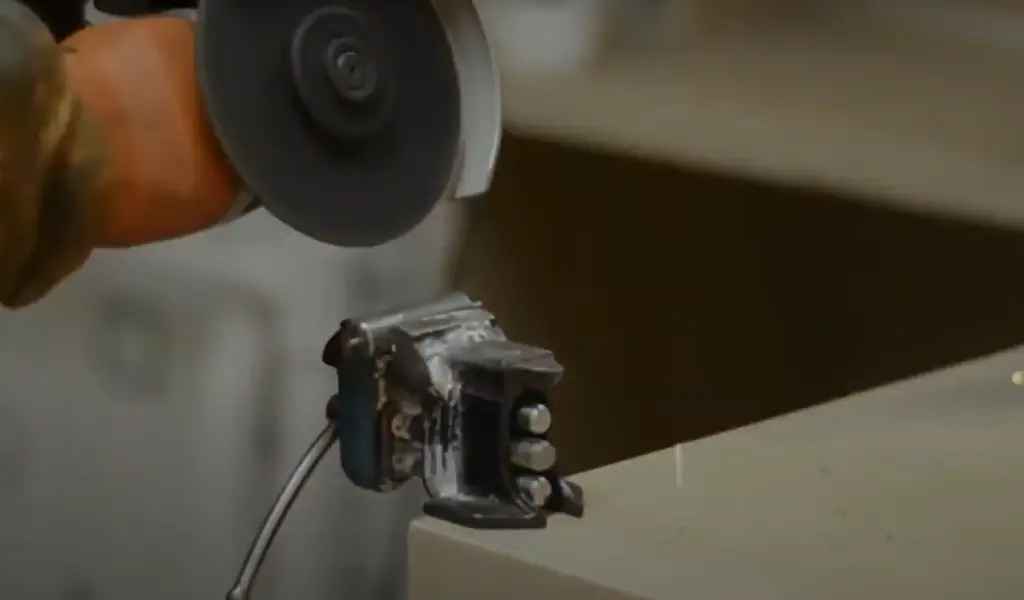
Platinum does not rust, making it an ideal material for applications where corrosion resistance is required.
Silver
Silver is a soft, white metal that is often used in jewelry and other applications where its beauty is admired. Silver does not rust, making it an ideal material for applications where corrosion resistance is required.
Stainless Steel
Stainless steel is a type of steel that contains chromium, which makes it resistant to corrosion. Stainless steel is used in a wide variety of applications, including cookware, plumbing fixtures, and medical devices. Stainless steel does not rust, making it an ideal material for applications where corrosion resistance is required.
Zinc
Zinc is a bluish-white metal that is often used to coat other metals to protect them from corrosion. Zinc does not rust, making it an ideal material for applications where corrosion resistance is required.[4]
Lead
Lead is a soft, heavy metal that is often used in construction and other applications. Lead does not rust, making it an ideal material for applications where corrosion resistance is required.[4]
Tin
Tin is a silvery-white metal that is often used in construction and other applications. Tin does not rust, making it an ideal material for applications where corrosion resistance is required.
These Metals Don’t Rust But…
There are metals that don’t rust, but they may have other drawbacks. For example, copper and brass will develop a patina over time that some people find unattractive. aluminum is lightweight and doesn’t rust, but it’s not as strong as steel.
Stainless steel contains chromium, which protects the metal from rusting by forming a protective layer on its surface.If you’re looking for a metal that doesn’t rust and is also attractive, copper or brass might be a good choice. These metals will develop a patina over time, but some people find this attractive.
aluminum is another metal that doesn’t rust, but it’s not as strong as steel and can be damaged more easily.[2]
How to prevent corrosion
Corrosion is the deterioration of a metal due to its reaction with its environment. This can happen when the metal is exposed to oxygen, water or other chemicals. There are many ways to prevent corrosion, and the most effective method depends on the type of metal and the environment it will be exposed to.
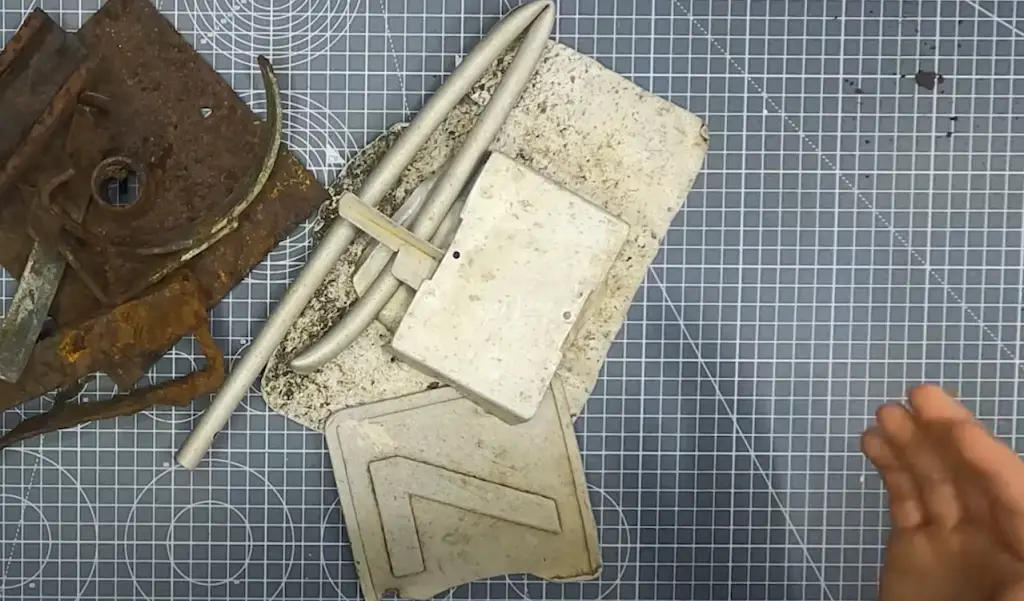
The most common way to prevent corrosion is to coat the metal with a layer of protection. This can be done with paint, powder coating or plating. The coating will protect the metal from oxygen and water, and it will also provide a barrier between the metal and any other chemicals that could cause corrosion.
Another way to prevent corrosion is to use metals that are resistant to it. Stainless steel is a common choice for this, as it is highly resistant to oxidation.
If you are concerned about corrosion, there are many ways to prevent it. The best method depends on the type of metal and the environment it will be exposed to. Coatings, alloys and other methods can all be effective at preventing corrosion.[3]
FAQ
What is the cheapest metal that doesn’t rust?
The cheapest metal that doesn’t rust is stainless steel. Stainless steel is an alloy of iron, chromium, and nickel. It is not susceptible to corrosion from water or air, making it an ideal material for a wide range of applications.
What metal is resistant to rust?
There are a number of metals that are resistant to rust, including stainless steel, titanium, and aluminum. These metals all have a high resistance to corrosion due to their composition or surface treatment.
What type of steel never rusts?
There are a number of types of steel that never rust, including stainless steel, titanium, and aluminum. These metals all have a high resistance to corrosion due to their composition or surface treatment.
Is titanium a rust?
No, titanium is not rust. Titanium is a metal with a high resistance to corrosion due to its composition or surface treatment.
What metal is best for outdoor use?
There are a number of metals that are resistant to rust, making them ideal for outdoor use. Stainless steel, titanium, and aluminum are all good choices for outdoor applications.
What metal is most weather resistant?
There are a number of metals that are resistant to rust, making them ideal for outdoor use. Stainless steel, titanium, and aluminum are all good choices for outdoor applications.
What metal lasts the longest outside?
There are a number of metals that are resistant to rust, making them ideal for outdoor use. Stainless steel, titanium, and aluminum are all good choices for outdoor applications.
What metal lasts the longest?
There is no definitive answer to this question as it depends on the application. Some metals, such as stainless steel and titanium, are resistant to corrosion and can last for many years. Other metals, such as aluminum, may not be as resistant to corrosion but can still have a long lifespan.
Useful Video: What metal does not rust?
Conclusion
While there are many metals that don’t rust, there are also a number of factors that can affect a metal’s ability to resist corrosion. If you’re concerned about rust, it’s important to consult with a corrosion expert to determine the best way to protect your metal surfaces.
In general, stainless steel and aluminum are good choices for corrosion-resistant metals. If you’re looking for a metal that doesn’t rust, these two options are a good place to start.
References:
- https://tampasteel.com/metals-that-dont-rust/
- https://www.metalsupermarkets.com/metals-that-dont-rust/
- https://metalscut4u.com/blog/post/top-8-types-of-metals-that-don-t-rust-tried-and-trusted.html
- https://www.yubisteel.com/metals-that-dont-rust/

